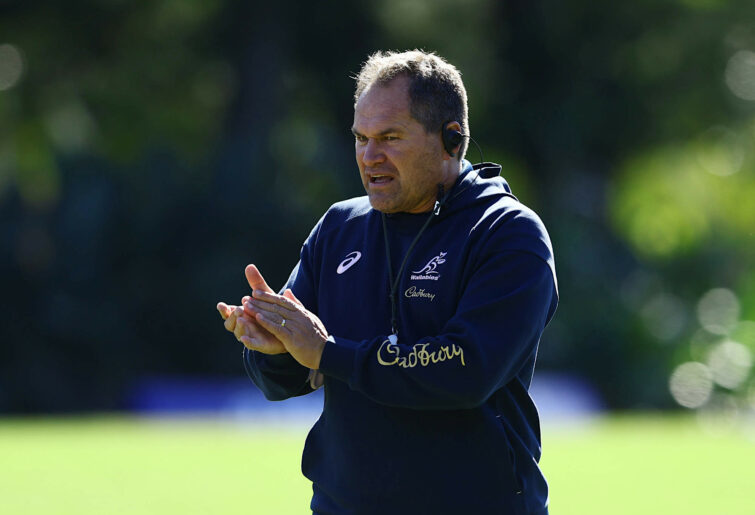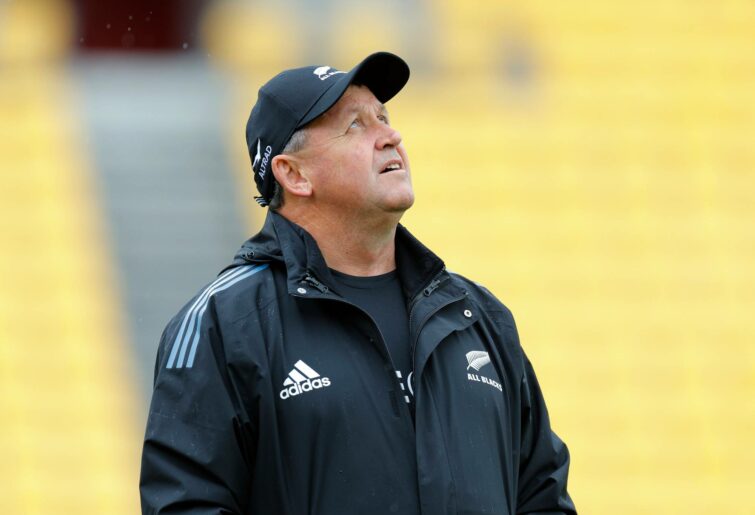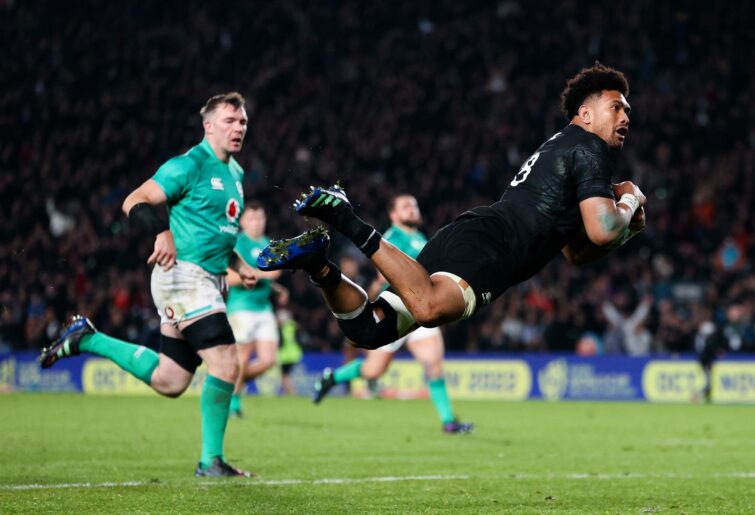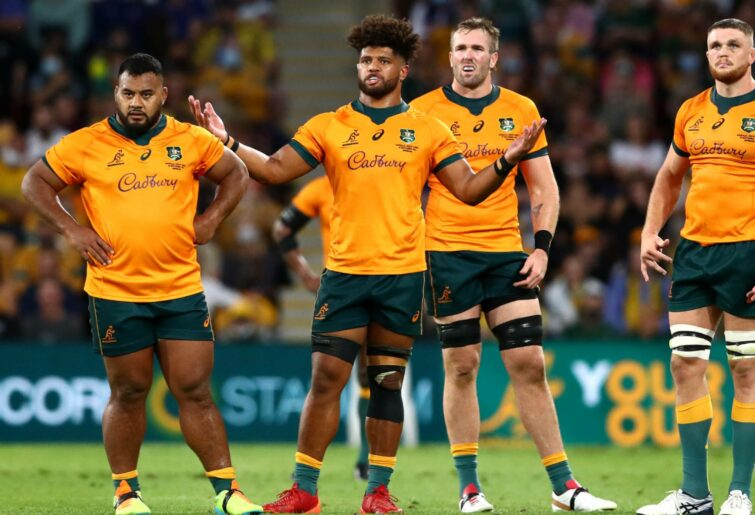
Anyone who happened to go ‘off grid’ last Sunday and re-emerge yesterday would be excused for wondering how the world so suddenly got turned on its head.
What we thought we knew about the four Rugby Championship contenders is no longer true. And there’s every chance that what we now think we know may well prove to be false, when hostilities resume again in a fortnight’s time.
Almost three years ago, at the completion of the 2019 World Cup, Michael Cheika was a broken coach. Unloved by the crowd and unwanted by his bosses, the Wallabies’ limp exit at the quarter-final stage capped what was at times a turbulent, and ultimately unrewarding tenure.
Today, having restored a deal of credibility through his work as a TV analyst, now in the blue and white of Argentina, Cheika sits atop the Rugby Championship; clubhouse leader after two rounds, with a side absolutely humming, having put seven tries on the Wallabies in San Juan.
What was a mature, composed second-half performance last week had Dave Rennie taking another step forward in his side’s progression.

Rennie goes from hero to zero after heavy San Juan defeat (Photo by Chris Hyde/Getty Images)
Today, he looks like just another in a long line of Wallabies coaches wondering if it will ever be possible for an Australian side to consistently string quality performances together.
Springboks coach Jacques Nienaber started his tenure from an impossible position; the Springboks already World Cup champions and a prevailing view that he was a puppet or secondary voice to that of his water boy.
A series win against Wales and a comprehensive first Test win over the All Blacks had Nienaber stepping out of the shadows, finally asserting his own stamp over the team.
A week later, he is just another coach found guilty of tinkering with a winning side, and in the process, getting a couple of key selections wrong.
Ian Foster’s ride is the weirdest one of all. Even when half of him is sailing downhill, the other half is pushing up what may prove to be an insurmountable slope. If Hamilton Zoo owned a Pushmi-pullyu, it would be named Fozzie.
Make no mistake, the All Blacks’ 35-23 win at Ellis Park ranks with one of the great wins in South Africa – of any All Blacks team of any era. Yet fan forums and talkback radio yesterday were overwhelmingly populated with demands for Foster’s sacking.
Such is the life of an international rugby coach.
The role of a head coach is arguably one of the most misunderstood in professional rugby. Of course, head coaches are highly influential; in charting the tactical course, in selection, in ensuring optimal team culture, clarity around messaging, and being a window to the media and supporter base.
In last week’s Roar Rugby Podcast, ex-England coach Stuart Lancaster described the outward facing demands placed on international coaches, and how these requirements and the amount of time eaten up by them, while being an important part of the territory, distract from inward-facing, ‘real’ coaching.
Part of the reason this occurs is due to accountability. For organisations to function efficiently, to learn from mistakes and to move forward positively, everyone involved must be accountable for their particular function. None more so than the person in charge.
When things go well – or more often, when things go poorly – people feel a need to ascribe credit or blame to individuals.
This is not always rational; when players do outstanding things they are lauded for their individual brilliance, but when they miss a tackle or bomb a try, it is more often put down to the coach failing to get the best out of them, or playing them out of position, or selecting them in the first place.
In truth, coaches would love to have more influence over outcomes than they actually do.
In this era, it is not the legendary orations of coaches like Alan Jones, or the paint-blistering exhortations of coaches like Graham Henry, inspiring young men to walk over hot coals for their country, that are the main driver of performance and outcomes.
These kinds of things still happen, but far less frequently, and with far less impact, than they used to.
Instead, matches turn on momentum swings. On tiny skill errors or execution. Tight calls by the officials, this way or that. Impact from the bench. A hot start forcing the other side to play catch-up rugby. An analyst pinpointing a hitherto unseen weakness in an opponent. Injuries impeding team cohesion. A selection imbalance got wrong or made right.
It is of course true that some coaches are better than others; at certain aspects of coaching and in an overall sense.
But just as Foster and Cheika haven’t turned into geniuses overnight, nor have Nienaber and Rennie turned into dunces.

(Photo by Hagen Hopkins/Getty Images)
Rather, it is a subtle shift in one or a number of the variables, along with lessons learned from failure, that mostly explain the turnaround in results.
And what a turnaround it was in Johannesburg, the home side far less clinical than they had been the week before; partly a result of the All Blacks asking more questions of them, and partly because new selections Joseph Dweba and Duane Vermeulen failed to have a positive impact on the match.
Almost all of the All Blacks’ main deficiencies from the first Test were addressed, starting with the threat posed by the Springboks’ contestable kicking game.
Whereas half of the Springbok’s 15 high bombs weren’t defused in Mbombela, this time around, of the 12 contestable kicks put up, the All Blacks conceded only two. That in itself represented a huge swing in possession and pressure, and influenced this result.
It didn’t stop there. The All Blacks attacked the Boks’ lineout at crucial moments, their maul defence was staunch, and their kicking game greatly improved. Jordie Barrett’s late nudge to the corner was artful, while Richie Mounga slotted clutch goals and carved off plenty of distance on his exit kicks.
Indeed, it was only when the All Blacks twice strayed from this conventional exit strategy that they got themselves into trouble. An awful brain fade from David Havili in the first half and an ill-advised pass by Caleb Clarke in the second, led to the Springboks’ two tries.
In contrast to Mbombela, the All Blacks were able to retain possession through multiple phases and apply pressure. Partly this was mental, via the ability to stay patient and not seek out the miracle ball, but mostly it was a function of a vastly improved attacking clean-out; urgent and accurate.
Watch again the lead-up to Havili’s crucial second-half try, which came during a period when the All Blacks were down to 14 men. Recycling after Rieko Ioane’s long run, a series of short, purposeful carries and powerful cleanouts rendered the Springboks impotent and unable to stem the tide, and made the try inevitable.
This type of direct play is what has been missing since last year, along with a sense that, with Shannon Frizell prepared to roll his sleeves up and work hard in the heavily populated lanes, here was a loose forward combination that actually felt like a combination, with defined, complementary roles.
There was much to like too, about how senior players, Ardie Savea and Sam Whitelock led from the front, and then the back, with their side under pressure, snaffling turnovers from under the Boks’ noses.

(Photo by Phil Walter/Getty Images)
Denied pay day through some of their traditional or expected avenues, the Springboks troubled the All Blacks on the edges. Despite the result not going their way, there was a case for Lukhanyo Am to be regarded as the outstanding individual on the park.
But the problem for the Springboks was that there was too big a drop down to too many of his teammates.
Not all is lost, however. Having clawed their way to a 23-21 lead in the 66th minute, with Beauden Barrett in the bin, the match was there for the winning. Having been run off their feet in the second quarter, the Boks had succeeded in slowing the tempo of the match, to have things played on their terms.
So it is tweaks rather than a rebuild that is required for Nienaber. Coupled with the return of Faf de Klerk, and his ability to apply intense defensive pressure and almost play the role of two defenders, the Wallabies can expect a fierce two weeks in Adelaide and Sydney.
While Dave Rennie was not looking to make any injury-related excuses, he too will be sweating on the return of a number of his wounded brigade.
He’ll need it, the Wallabies’ depth exposed by a clinical Pumas performance that was a step ahead in almost every respect.
On the latest edition of The Roar Rugby Podcast, experts Brett McKay, Harry Jones and Jim Tucker react to Argentina’s big win over the Wallabies. Listen now or save it for later.
Things were off-kilter right from the start; Tom Wright spilling a sharp pass from Jordan Petaia he was entitled to take, then Fraser McReight doing the same on the next play. Two dropped passes and a poor tackle by Taniela Tupou meant 0-14 after six minutes.
Two key plays effectively stunted any hope of a Wallabies comeback. Firstly a 21st minute try by James O’Connor was rubbed out for an illegal cleanout by James Slipper in the lead up. While it looked iffy at first glance, it involved no lifting or head contact, and stretched the bounds of what might be considered dangerous.
Sixteen points adrift and with the Wallabies needing to be the first side to score after half-time, Petaia looked certain to score, until Gonzalo Bertranou stripped him of the ball immediately after they crossed the try-line.
That episode seemed to suck the spirit and the shape out of the Wallabies who, despite Rob Valetini continuing to truck the ball up manfully, looked less convincing as the match went on.

(Photo by Chris Hyde/Getty Images)
Disappointingly, they fell into the same discipline failings that have frustrated fans over recent years; checking a player off the ball, playing a man in the air, an unnecessary push, then McReight shown a yellow card for persistent offending.
In the end, 48-17 was just reward for a Pumas side who played the right type of game for the sunny, firm conditions; confident ball movement mixed with smart kicking, to pressure a fragile Wallabies back-field directly into giving up four tries.
Other big advances from last week for the Pumas were their commitment to the collision, increasing ability to slow down the Wallabies’ attack and more clinical finishing.
For the second successive week, Juan Martin Gonzales streaked away impressively for a try, while the angle of Jeronimo del Fuente’s run was so convincing, he was able to score despite pinging a hamstring along the way.
All of which means that Cheika heads to New Zealand in the unlikely position of ladder leader. Just who he faces as coach of the All Blacks remains to be seen.
Foster himself was coy after the match, but Havili – a Crusaders player – made the view of the playing group clear. “He’s a smart coach, we love playing for him and our performance tonight showed that,” he told Sky’s Jeff Wilson.
A hastily convened press conference yesterday by CEO Mark Robinson achieved nothing except to leave everybody hanging onto their seats for another few days.
Perhaps if there is to be change in New Zealand rugby, it could come in the Sky commentary box, with veteran match caller Grant Nisbett and comments man Justin Marshall struggling to do justice to such a fine match.
Nisbett completely forgetting how the advantage rule has been refereed for the last decade was one thing, but confusing Mapimpi for Am, Marx for Wiesse, Malherbe for de Jager, Mapimpi for Willemse and Frizell for Vaa’i was worse than sloppy.
Mistakes are easily enough made and forgiven, but viewers deserve better than this.

Leave a Reply